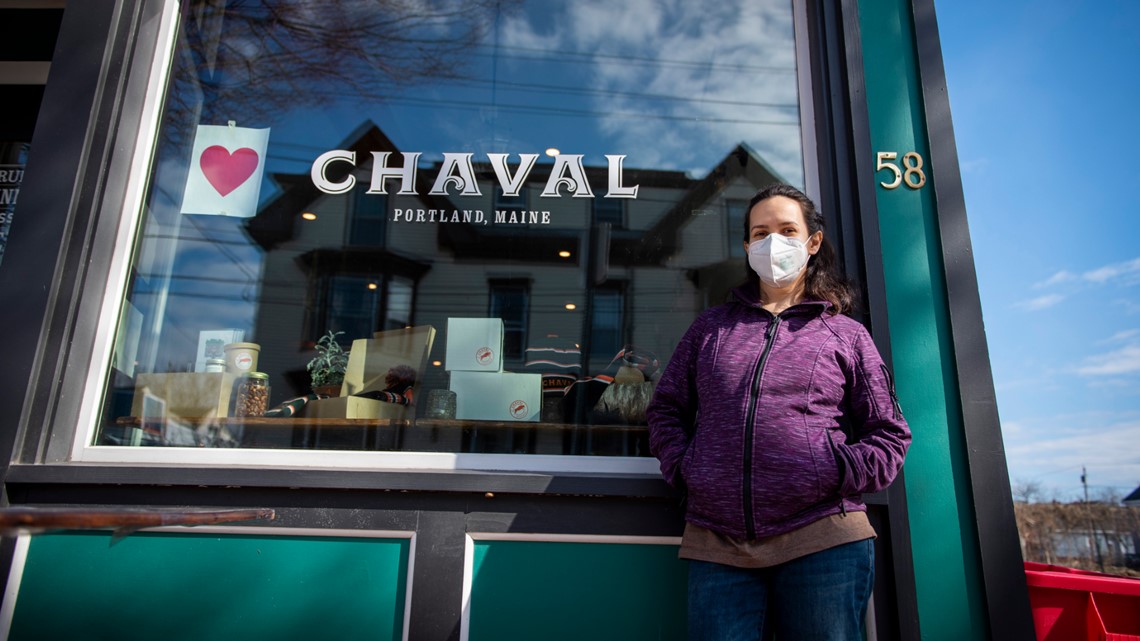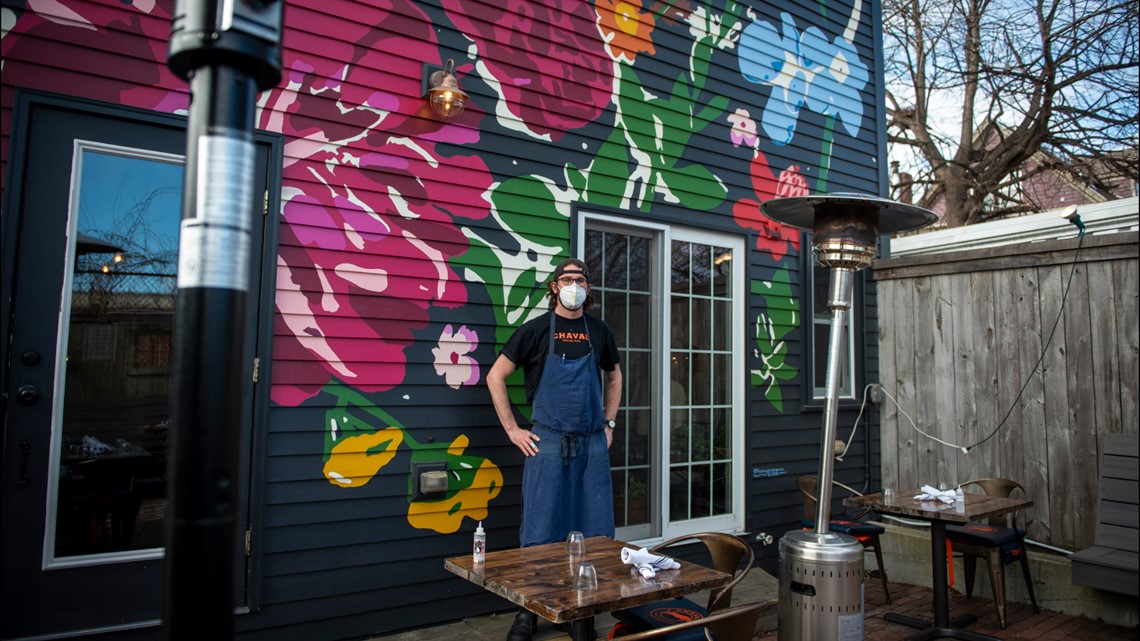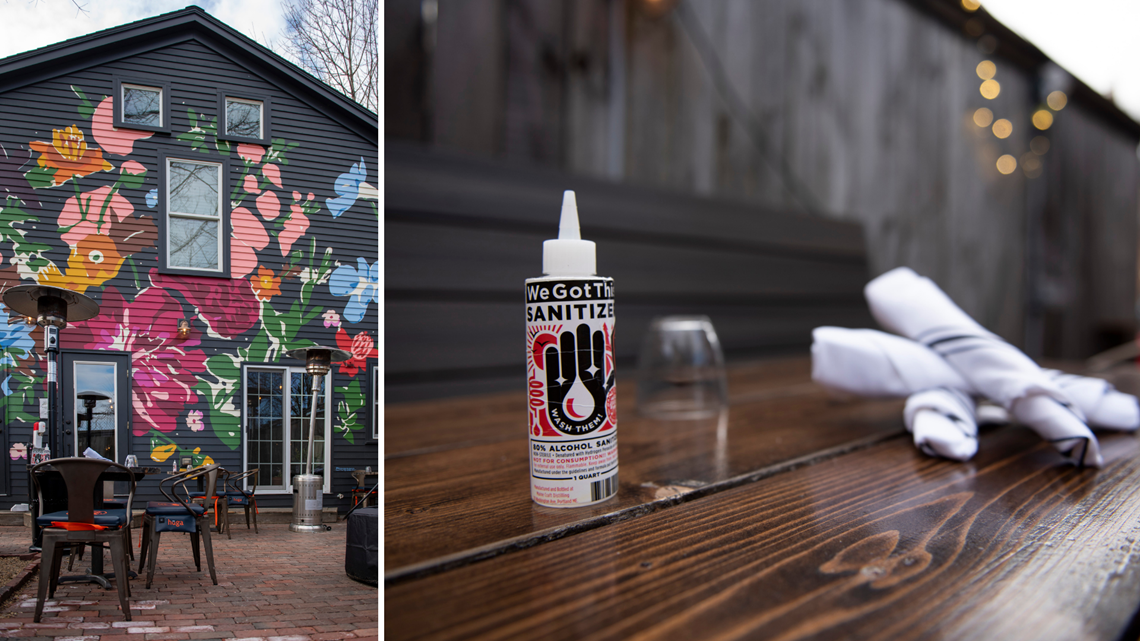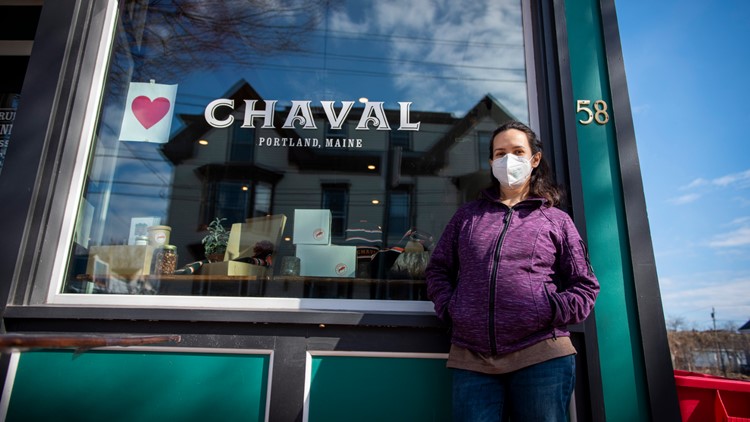PORTLAND, Maine —
The restaurant industry in Portland has undoubtedly changed, and the full scope of the pandemic's effects likely won't be known for years. But those that have survived, and in some cases thrived, in the past year are looking towards a brighter future, embracing the changes rather than succumbing to the hardships.
These are just some of their stories.
Stay tuned this week for more parts to this story.
PART 2: Ilma Lopez, co-owner of Chaval
Ilma Lopez and her husband Damian are lucky. They found jobs that are more than just work. It’s their passion. But they didn’t realize just how much they loved their work until the pandemic hit.
As co-owners of Chaval, a Spanish- and French-inspired brasserie in Portland’s West End, they’ve endured mental and emotional hardships to keep their doors open through the pandemic. But Ilma says despite the challenges, “It has been super rewarding.”


“Our team is great, and the way they work and how hard they work has been really uplifting," she said.
Chaval isn’t in the heart of the downtown—it’s a little bit off the beaten path. But it’s one of the highest-rated restaurants in the city, and Ilma points out, Chaval is a neighborhood restaurant. The changes Ilma and Damian made to stay open, like having outdoor-only dining, have highlighted the way their community has supported them.
“Our guests have been nothing but supportive," she said.
“If you told me two years ago that people in Maine are going to be eating outdoors [in the winter] I would have been like, ‘No way … they are going to hate it,’” Ilma said.
A few weeks ago, it was snowing, she recalled, but people were drinking cocktails and enjoying wine around the fire pit on the outdoor patio.
“People have been pretty receptive of the outdoor spaces. They're fun, you know … we all live in Maine. We've all gone to our friend’s house and sat by a bonfire in a snowstorm and drank beer… that's part of the culture a little bit and no one really shied away from it,” Chaval chef de cuisine Kirby Sholl said. He said it’ll be interesting to see what winter dining looks like in the future. “We never operated this as a 12-month patio. We didn't even think about it as an option.”
“Basically, [the situation] is not great, but it has been really a nice experience to see how our community has embraced the change and how our community has embraced us,” she said. “Selfishly, that makes me feel really good.”


Chaval has taken safety seriously since the pandemic hit the state. Like all businesses, they had to figure out a way to safely stay open.
They closed at the start of the pandemic and did takeout. For Kirby, it was a nice break—at first.
“But after a while, it became really mentally draining,” he said. “Obviously there were a lot of restaurants still operating in some capacity and it was difficult as a professional to sit on the sidelines and just wait it out.”
Kirby said when they reopened in July for outdoor dining they had a skeletal crew—three people in the kitchen, and a couple of servers. “That was physically demanding mentally demanding too, but we were able to be successful enough to bring in some more people and kind of fall back a little bit more into our previous roles,” he said.
Chaval has been strictly outdoor-only and plans to stay that way through the summer and potentially longer. Masks are required, even at tables, except when eating or drinking, and using hand sanitizer regularly is enforced for both guests and staff.


Luckily for Chaval, they already had a large outdoor patio area, so it was easy to pivot. “We didn’t have to build it out [like a lot of other places],” Kirby said. “Everyone is just doing what they gotta do to survive and there's no judgment ... you do what you gotta do to keep the lights on.”
Chaval added special touches to the patio like standing and overhead heaters, as well as heated cushions, which are locally made.
Ilma said some customers who aren’t regulars have been taken aback by how many rules they have, but she said their regulars “actually appreciate it.”
“And that to me, speaks 1,000 words,” she said.
Kirby said that considering everything, they had a successful winter.
“Between takeout and the patio and the greenhouses … We were busier in some February weeknights than we were a year ago,” he said.
“It was hard all around for everybody,” Kirby said, referring to restaurants that closed. “But, it kind of turned into a game of survivalism to be honest.”
He remembered how Portland had just been named Restaurant City of the Year in Bon Appetit magazine, which was “sort of like walking on clouds,” he said. “We could do what we want. People would come from all over the country and eat whatever we put in front of them, and now … all that disappeared real fast.”
The year has been hard for Ilma, Damian, and her staff. In terms of business, she said it’s been “all over the place.”
“But we're still together, we're healthy,” she said, knocking on the wood table.
Ilma and Damian closed their other restaurant, Piccolo, a small Italian restaurant downtown that was known for homemade pasta and rustic Italian cuisine. Ilma said they couldn’t financially sustain both restaurants.
"The difficult decision to close our restaurants during the COVID-19 pandemic is based on our belief that we are part of a greater whole, and that we are responsible for taking care of our extended community, our family, and our friends," they wrote in a note, explaining their decision to close. "Our mission is to serve and to give back to the people who have helped us grow. We believe that each of us must do our part to help. We are all affected by this pandemic. Our focus will always be on the well-being of our community and our team."
“The financial implications of literally everything became a lot more profound,” Kirby said. “Obviously, I don't own the business, but I also don't want to lose my job again. Everything is under a microscope, and it's stressful.”
Ilma said the constant changes and reassessments they've had to make as owners to keep Chaval open have shown how resilient they are.
"The things that we are able to produce right now, with less staff, we're like, 'Oh my God, you guys are amazing,'" she said.
Kirby said he thinks this summer will be “our Maine summer on steroids,” and he also doesn’t see the tourism season ending in August. “I think it’ll be a steady flow of people through September and October.”
“It's going to be a lot, but we’re fortunate to be in that position,” he said. “We're fortunate to cook and do business in a place where people are drawn to.”
As for Portland’s reputation as a “foodie” city, Ilma doesn’t think that’s in jeopardy, "because you have a lot of hungry cooks out there and you have a lot of hungry chefs and you have people that ... this is our livelihood."
"We don't have another option," she said. "And we love what we do."
"I think more so we're going to work harder than we did before. And smarter than what we did before. Not that we did something bad before, we just didn’t know .... how fragile we really were," Ilma said. "I didn't want to acknowledge how fragile we were until [the pandemic] happened and we just crumbled like everyone else."
"So, no. We're not going anywhere."


